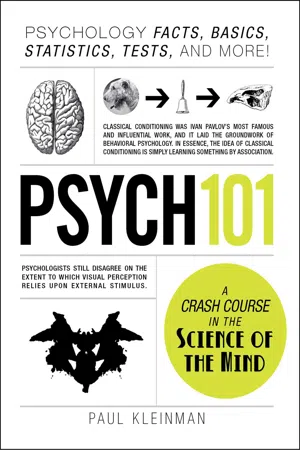
- 288 pages
- English
- ePUB (mobile friendly)
- Available on iOS & Android
About This Book
A hands-on approach to exploring the human mind Too often, textbooks turn the noteworthy theories, principles, and experiments of psychology into tedious discourse that even Freud would want to repress. Psych 101 cuts out the boring details and statistics, and instead, gives you a lesson in psychology that keeps you engaged - and your synapses firing.From personality quizzes and the Rorschach Blot Test to B.F. Skinner and the stages of development, this primer for human behavior is packed with hundreds of entertaining psychology basics and quizzes you can't get anywhere else.So whether you're looking to unravel the intricacies of the mind, or just want to find out what makes your friends tick, Psych 101 has all the answers - even the ones you didn't know you were looking for.
Frequently asked questions
Information
DEDICATION
the one person who can deal with my craziness
and always manage to keep me sane.
Table of contents
- Cover
- Dedication
- Introduction
- Ivan Pavlov
- B. F. Skinner
- Sigmund Freud
- Anna Freud
- Lawrence Kohlberg
- Stanley Milgram
- Alfred Adler
- Basic Theories on Groups
- Philip Zimbardo
- Solomon Asch
- John B. Watson
- Hermann Rorschach
- Visual Perception
- Gestalt Psychology
- Cognitive Psychology
- Cognitive Dissonance Theory
- Drive Reduction Theory
- Harry Harlow
- Jean Piaget
- Albert Bandura
- Carl Rogers
- Abraham Maslow
- Theories of Intelligence
- Kurt Lewin
- Carl Jung
- Henry Murray
- Left and Right Brain
- Love
- Karen Horney
- John Bowlby
- Attribution Theory
- Emotion
- Personality
- Leadership Theories
- Dreams
- Art Therapy
- Hypnosis
- Albert Ellis
- Cognitive Behavioral Therapy
- Heuristics
- Harry Stack Sullivan
- The Magical Number Seven, Plus or Minus Two
- Erich Fromm
- The Good Samaritan Experiment
- Personality Disorders
- Dissociative Disorders
- The Rosenhan Experiment
- David Kolb’S Learning Styles
- Anxiety Disorders
- Mary Ainsworth and Strange Situations
- Mood Disorders
- Lev Vygotsky
- Somatoform Disorders
- False Consensus and Uniqueness Effects
- Stress
- Self-Discrepancy Theory
- Insert Illustrations
- Acknowledgments
- Copyright